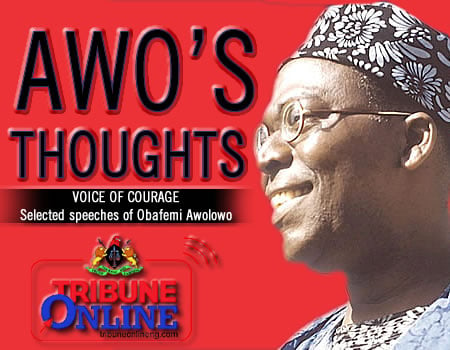CONTINUED FROM LAST WEEK
For even during our stay with you we laid down the rule: the man who will not work shall not eat. We mention this because we hear that some of your number are idling their time away, minding everybody’s business but their own. It is pertinent to observe that the motto of the Soviet Union “The man who will not work shall not eat” is borrowed from Paul the Apostle of Christ, without the courtesy of an acknowledgment.
Though the practice of communal living of the early Christian Church has fallen into desuetude, the ideals remain, and they are substantially identical with socialist ideals.
What goes for Christianity goes for other religions, such as Islam, as well. There can, therefore, be no real antagonism and antithesis, as regards principles, between socialism and religion. Indeed, because of their indisputable identity of principles, they should both be mutually sustaining.
SEVEN: When all this has been said, it is contended that it is possible to achieve the goal which socialism sets out for itself without adopting its declared methods of regulating consumption, and vesting the means of production in the State. The so-called socialist ends, the contenders continue, can be attained by planning through the means of invisible social controls which can be exercised by the manipulation of the market and the price mechanism, by the judicious employment of the monetary and fiscal weapons, by fostering the mobility of resources including manpower, and by the rationalization of international trade, etc. By doing all this the profit motive, which is the only powerful incentive to productive activities, will be retained, and, at the same time, the social objectives envisaged by the socialists will be achieved.
Three things are fundamentally wrong with these contentions. Firstly, we have seen that greed is evil and that anything which is evil is bound to disintegrate and perish in the course of time. But greed is the basis of capitalism, whether subjected to invisible social controls or not. Secondly, for one thing the so-called invisible social controls are not exercisable, nor are they ever exercised, until there is a sign of trouble; and by such a time, it is already too late to mend. For another, experiences, over a long period of time, have shown that these invisible social controls, even when they have been wielded under the guidance and close surveillance of the ablest economists, have failed woefully to prevent disaster, and ever-recurrent crisis and painful upheavals in the capitalist economy. Thirdly, where individual greed or naked self-interest is bliss, it is impossible successfully to produce and execute any plan which aims at benefitting all and sundry equally. Before we come to the end of this chapter, certain important issues deserve attention and consideration.
Socialism, as we have said, and as it is generally agreed by all socialists, is a non-native social science. Before any theory at all can answer to the name of science, it must be of universal application. If any principle is purely and strictly peculiar to a given institution, region, or State, it may be a custom, practice, or even a theory, but it certainly cannot lay claim to the status of science. Just as there can be no African ethics qua Ethics as a science. or African logic, so there can be no African socialism. Those who have spoken of African socialism, or Pragmatic African Socialism, have fallen into three major errors. In the first place, the protagonists of African socialism have mistaken certain African customs and social practices for socialism.
Such practices and customs as savings through Esusu (thrift) society, and the family or communal ownership ofland, do not by themselves amount to socialism, especially when family ownership of land and means of production go side by side with communal ownership of land, leading from time to time to violent conflicts between one family and another, or between one or more families and the rest of the community.
In the second place, though there was, by and large, absence of greed in primitive African communities for material acquisitions and extensive ownership of private properties, this, in our view, was not due to any adherence to the rinciples of socialism of which they were never conscious, but rather to insuperable physical obstacles to such acquisitions and ownership. In the absence of adequate and efficient communications; in the midst of incessant inter-tribal and internecine wars, with their attendant grave insecurity to property and life; and in the absence of portable and durable means of exchange which, apart from anything else, could serve as store of value, the desire and the greed to accumulate the things ofthis world were reduced to the barest minimum. In the latter connection, it may be mentioned by way of illustration, that the medium of exchange in Yorubaland, before the advent of the British, was the cowry. Twenty thousand of these shells were known as ‘One Sack’, and it was equivalent to 5/ -. It takes an able-bodied person to carry this ‘One sack’. A man who owned ‘One Sack’ was regarded as wealthy; and the person who possessed 50 sacks, that is £12 10S., was a ‘millionaire’ and was reputed to be fabulously rich. Now, in time of emergency which necessitated flight in the face of the enemy, this’ millionaire ‘would require 50 able- In the circumstances, therefore, it would be madness for anyone to possess too much of either perishable farm products, or unwieldy cownes.
The invention of an easily portable and durable medium of exchange which, by itself, also has value, marked the beginning of excessive greed in the acquisition of material wealth. The improvement of communications also helped to fan this anti-social passion beyond all imaginable proportions.
CONTINUES NEXT WEEK
YOU SHOULD NOT MISS THESE HEADLINES FROM NIGERIAN TRIBUNE
We Have Not Had Water Supply In Months ― Abeokuta Residents
In spite of the huge investment in the water sector by the government and international organisations, water scarcity has grown to become a perennial nightmare for residents of Abeokuta, the Ogun State capital. This report x-rays the lives and experiences of residents in getting clean, potable and affordable water amidst the surge of COVID-19 cases in the state…
Selfies, video calls and Chinese documentaries: The things you’ll meet onboard Lagos-Ibadan train
The Lagos-Ibadan railway was inaugurated recently for a full paid operation by the Nigerian Railway Corporation after about a year of free test-run. Our reporter joined the train to and fro Lagos from Ibadan and tells his experience in this report…
[ICYMI] Lekki Shootings: Why We Lied About Our Presence — General Taiwo
The Lagos State Judicial Panel of Inquiry probing the killings at Lekki Toll Gate, on Saturday resumed viewing of the 24hrs footage of the October 20, 2020 shooting of #EndSARS protesters by personnel of the Nigerian Army…
ICYMI: How We Carried Out The 1993 Nigerian Airways Hijack —Ogunderu
On Monday, October 25, 1993, in the heat of June 12 annulment agitations, four Nigerian youngsters, Richard Ajibola Ogunderu, Kabir Adenuga, Benneth Oluwadaisi and Kenny Razak-Lawal, did the unthinkable! They hijacked an Abuja-bound aircraft, the Nigerian Airways airbus A310, and diverted it to Niger Republic. How did they so it? Excerpts…
Sahabi Danladi Mahuta, a community mobiliser and APC chieftain. Mahuta spoke to select journalists at the sidelines of an Islamic conference in Abuja recently. Excerpts…






